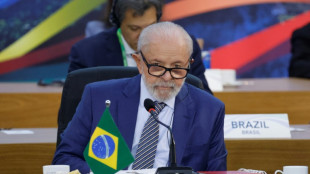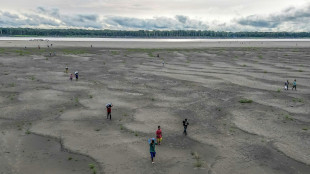
-
 UN General Assembly calls for 'unconditional' Gaza ceasefire
UN General Assembly calls for 'unconditional' Gaza ceasefire
-
Dortmund fear 'worst-case scenario' after Schlotterbeck injury

-
 Juve deepen Man City crisis, Barcelona into Champions League knockouts
Juve deepen Man City crisis, Barcelona into Champions League knockouts
-
'Incredible' Saka makes the difference for Arsenal: Arteta

-
 'We want more', says Olmo with Barcelona bound for knock-outs
'We want more', says Olmo with Barcelona bound for knock-outs
-
Guardiola 'questioning self' after latest City loss at Juve

-
 Nasdaq surges above 20,000 after US inflation data matches estimates
Nasdaq surges above 20,000 after US inflation data matches estimates
-
Torres sinks Dortmund to send Barcelona into knockouts

-
 UN General Assembly calls for 'unconditional' ceasefire in Gaza
UN General Assembly calls for 'unconditional' ceasefire in Gaza
-
US House passes defense bill banning gender care for minors

-
 Turkey says Ethiopia, Somalia reach compromise deal to end feud
Turkey says Ethiopia, Somalia reach compromise deal to end feud
-
Saka brace sinks Monaco as Arsenal eye Champions League last 16

-
 Man City crisis deepens with Champions League defeat at Juventus
Man City crisis deepens with Champions League defeat at Juventus
-
Ashworth exit 'not the best' for Man Utd says Amorim

-
 Romero sorry over Spurs transfer jibe: Postecoglou
Romero sorry over Spurs transfer jibe: Postecoglou
-
Lula to undergo new operation to 'minimize' cranial bleeding risk

-
 New Syria PM says will 'guarantee' all religious groups' rights
New Syria PM says will 'guarantee' all religious groups' rights
-
Wolfsburg earn key win over Roma in Women's Champions League, Lyon net six

-
 Murder rate in Amazon far higher than rest of Brazil: study
Murder rate in Amazon far higher than rest of Brazil: study
-
Malibu wildfire grows as thousands still evacuated

-
 Pachuca down Botafogo in Intercontinental Cup
Pachuca down Botafogo in Intercontinental Cup
-
UN General Assembly to vote on 'unconditional' ceasefire in Gaza

-
 Nine killed in Haiti in latest gang attack
Nine killed in Haiti in latest gang attack
-
US-China officials to hold economic talks before Trump return

-
 Saudi Arabia gave 'assurances' over LGBTQ fans at World Cup: English FA
Saudi Arabia gave 'assurances' over LGBTQ fans at World Cup: English FA
-
Rangers can create magical night against Tottenham, says Clement

-
 Galliano says leaving Maison Margiela after 10 years
Galliano says leaving Maison Margiela after 10 years
-
Stocks mostly rise as US inflation data boosts rate cut hopes

-
 Sundance unveils eclectic lineup for 2025
Sundance unveils eclectic lineup for 2025
-
FIFA confirms Saudi Arabia as 2034 World Cup host

-
 Germany's Scholz urges investment in 'future EU member' Ukraine
Germany's Scholz urges investment in 'future EU member' Ukraine
-
EU conservatives seek to stall 2035 combustion engine ban

-
 2034 World Cup in Saudi Arabia puts lives at risk: rights groups
2034 World Cup in Saudi Arabia puts lives at risk: rights groups
-
Russia vows retaliation after Ukrainian ATACMS strike

-
 Canada central bank makes half point rate cut to 3.25%
Canada central bank makes half point rate cut to 3.25%
-
US consumer inflation accelerates for second straight month in November

-
 Lula alert, 'progressed well' since intracranial surgery
Lula alert, 'progressed well' since intracranial surgery
-
Relatives of Syria's disappeared seek closure in Damascus morgues

-
 Food fight: $25 bn US grocery deal falls apart
Food fight: $25 bn US grocery deal falls apart
-
Google unveils latest AI model, Gemini 2.0

-
 MSF resumes some activities in Haiti's capital
MSF resumes some activities in Haiti's capital
-
NFL announces Berlin game for 2025 season

-
 Apple adds ChatGPT integration in latest software update
Apple adds ChatGPT integration in latest software update
-
US consumer inflation rises for second straight month in November

-
 Afghan refugees minister killed by suicide blast
Afghan refugees minister killed by suicide blast
-
Alisson savours 'perfect' Liverpool return

-
 Crunch time for Saudi-hosted drought, desertification talks
Crunch time for Saudi-hosted drought, desertification talks
-
FIFA to confirm Saudi Arabia as 2034 World Cup hosts

-
 Macron urges release of Georgia protesters in Ivanishvili talks: Elysee
Macron urges release of Georgia protesters in Ivanishvili talks: Elysee
-
France's Macron races to choose new PM


EU and S.America countries conclude divisive trade deal
The EU and four South American countries concluded a huge but controversial trade deal on Friday despite fierce opposition from France, which called the agreement "unacceptable."
The deal between Brussels and four members of the Mercosur bloc -- Argentina, Brazil, Paraguay and Uruguay -- aims to create a 700-million-customer free-trade area.
EU Commission chief Ursula Von der Leyen announced the agreement finalizing negotiations on the accord, which has been 25 years in the making, at a Mercosur summit in Uruguay.
"This is a win-win agreement," she said, telling European farmers it took into account their fear their livelihoods would be undercut by cheaper beef, sugar and soybeans from Brazil particularly.
Brazil's President Luiz Inacio Lula da Silva, who together with Spain and Germany had been pushing to get the deal over the line this year, said the negotiated text was "balanced" and mindful of the impact on climate change.
- France balks -
France, led by a weakened President Emmanuel Macron after the collapse of his government this week, reiterated that it found deal "unacceptable" in its current form.
"This is not the end of the matter," an official in Macron's office said, noting that the deal still had to go through the EU ratification process.
French Trade Minister Sophie Primas told AFP the deal "only commits the commission, not the (EU) member states."
The EU-Mercosur pact still needs to be green-lit by at least 15 of the European Union's 27 member nations representing 65 percent of the EU population, and by the European Parliament.
Von der Leyen called the agreement "a truly historic milestone" that would build trade bridges at a time when "strong winds are blowing in the opposite direction, towards isolation and fragmentation."
Her remarks were seen as a nod to threats by US President-elect Donald Trump to hike tariffs on imports when he takes office in January, possibly triggering trade wars.
The European farmers' group COPA-COGECA immediately affirmed its opposition to the deal, saying it would have "profound consequences" for family farming across the EU and calling a protest in Brussels on Monday.
EU countries and the European Parliament "must now firmly challenge the terms of this agreement," the umbrella organization said.
The French farming union FNSEA-Young Farmers accused von der Leyen of having "betrayed European farmers."
France, which has been rocked by successive protests by farmers, has tried to forge a blocking minority of EU countries.
Poland has rallied to France's side, and Italian government sources say Rome believes "the conditions are not met" to back the deal. The Netherlands and Austria have also expressed reservations.
But Germany, eager to open trade opportunities amid gloom for its manufacturing sector, has strongly come out in favor of the EU-Mercosur deal, as has Spain.
German Chancellor Olaf Scholz said on X that "an important hurdle" had been overcome.
Spanish Prime Minister Pedro Sanchez hailed a "historic agreement" that would form "an unprecedented economic bridge between Europe and Latin America."
- Assurances on climate -
The broad outlines of a deal were agreed back in 2019 but it was never ratified amid concerns over the impact of Brazilian farming on climate change, among other issues.
Von der Leyen acknowledged those worries, saying the new deal "reflects our steadfast commitment to the Paris Agreement (on fighting climate change) and to the fight against deforestation."
Lula said on X that the latest text "is very different to the one announced in 2019," without giving details.
Sources familiar with the negotiations told AFP the deal included changes to chapters including on government contracts, services, intellectual property and the environment.
Von der Leyen sought to appease European farmers, telling them: "We have heard you, listened to your concerns, and we are acting on them. This agreement includes robust safeguards to protect your livelihoods."
The deal, once ratified, would allow the EU to export cars, machinery and pharmaceutical products more easily to South America.
In return, agricultural giant Brazil and its neighbors would be able to sell meat, sugar, rice, honey, soybeans and other products to Europe with fewer restrictions.
J.Fankhauser--BTB
